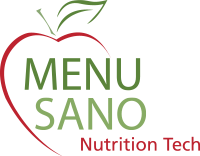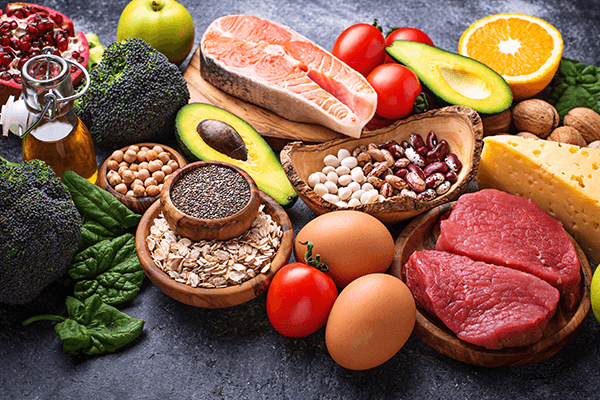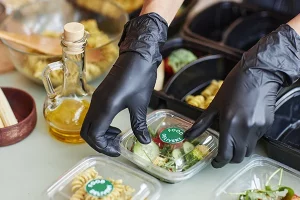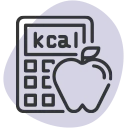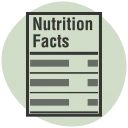Breast Cancer Awareness month is upon us this October. The symptoms of cancer can be severe, and the rehabilitation process may be lengthy and trying but fortunately, there are some things that can be done to help, and luckily it’s something we can all do quite easily.
Healthy eating by itself cannot cure or prevent cancer in those that are genetically inclined to be impacted by the disease.
However, eating a healthy diet can have positive benefits on patients undergoing and recovering from treatment. This blog will show you how to make meals that incorporate healthy nutrition habits for a faster recovery.
Focus on the Good Fats
When thinking about fats for your diet, do not assume that they are all the same. Healthy fats like monounsaturated and polyunsaturated fats are essential to the diet. These types of fat promote good heart health, which reduces your risk for cardiovascular disease.
Healthy fats can help you feel full faster because it slows digestion. Eating the right number of calories for your body can mean a better recovery after surgery or an illness.
To get more of the good stuff in your diet, try cooking your veggies with healthy fats, add them to salads or throw some on top of whole-grain toast with a bit of vegan margarine instead of butter.
Read more: How to Operate in the New Post-COVID Era
Vegetables and Fruits are High in Vitamins and Nutrients
Fruits and vegetables are high in antioxidants. Antioxidants help your immune system fight off disease.
There are lots of different vitamins in fruits and vegetables, like A, C, E, K, B6, and B12. These vitamins boost the body’s ability to fight back against cancer cells.
Just like with protein and carbs, eat a rainbow of colors by trying new fruits or veggies each week. And don’t forget about cruciferous veggies; they contain good gut bacteria that can protect your body from cancer-causing chemicals found in foods like meat that isn’t organic or prepared using cooking methods that involve charring or smoke.
While fresh fruits and vegetables are generally better than frozen when recovering either option works. When you can’t stomach solid food after treatment for cancer, smoothies may be a good way to get fruits and vegetables into your diet. You can either blend them into a drink or use them in sauces, like pesto. Either way, you’ll get the nutrients without feeling like you need to chew.
But don’t just stick with fruits and veggies because they’re “healthy”; think about how they can contribute to your health goals or diet preferences. For example, if you want to increase fiber, load up on leafy greens, cruciferous vegetables (like broccoli), and berries—which are all high in fiber yet low in calories.
Read more: Responding to COVID-19
Proteins are Important
Proteins are an essential building block of life and are good for your health in multiple different ways. They are made up of amino acids which help your body grow cells and repair tissues. They can also help fight infection helping to maintain a healthy immune system and improve recovery after an illness.
Proteins can be found in meats or from other sources. Meats are the most common source of protein but when dealing with cancer they should be avoided. In fact, studies from Cancer Research UK and the Cancer Council of NSW both point to processed meat as a leading cause of increased cancer risk. Nuts, legumes, and soy are tasty alternatives to meat that may be prepared into a variety of delectable meals.
Read more: Operating in a Post-COVID World with Jo-Ann McArthur of Nourish Marketing
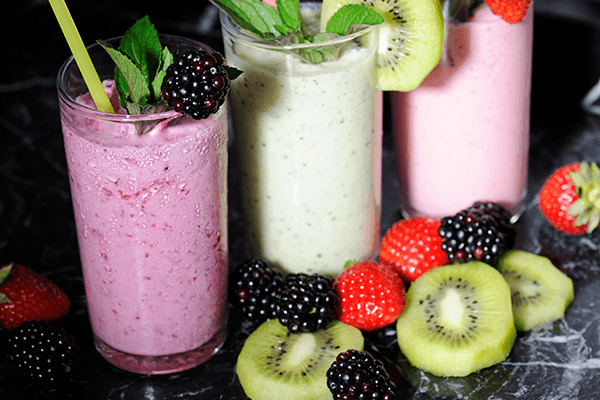
Stay Hydrated
The value of hydration in diet cannot be overemphasized.
When you are dealing with breast cancer in particular, the tumor cells have an easier time metastasizing when hydration levels are low.
This is because water intake forces wastes to be excreted by the body’s elimination system which includes the kidneys and liver. The presence of sufficient fluid for this excretion process allows these organs to function properly so that they may assist in ridding the body of harmful toxins faster.
Studies also show that when dehydration occurs it inhibits healthy cell regeneration throughout all parts of your body. This is particularly true in your skin tissues which will become dryer and more sensitive as a result of inadequate fluid intake so extra care should be taken to minimize such problems even if it means increasing liquid consumption.
Read more: A Conversation with Chef Luciano Schipano
Hydrating Foods
The right foods can help combat dehydration. Fruits and vegetables contain a high percentage of water, so include them in your daily diet wherever possible.
Citrus fruits such as oranges, grapefruit, lemons, and limes, for example, can help restore vitamin C levels that may become depleted during chemotherapy treatments. These fruits also stimulate the immune system which is especially important in cancer patients whose ability to fight infections has been hindered by radiation therapy or surgery resulting in lowered white blood cell counts.
Watermelon is another excellent choice because of its high water content as well as its high lycopene, vitamin A and C levels which are thought to have anti-cancer benefits.
Some good vegetables to consider include tomatoes, carrots, broccoli, and cucumber. Leafy green vegetables should also be consumed as they are a rich source of antioxidants that help protect healthy cells from mutating into cancer cells.
It can be challenging to eat these types of food during treatment as the available energy might not allow it but consider focusing on smoothies. Smoothies offer all of the benefits from an array of antioxidant-rich fruits and veggies while allowing patients with a compromised appetite to easily take in all the goodness that nature has to offer with just a single glass.
Read more: Canadian Women in Food with Cheryl Appleton
Herbal Teas
Various herbal teas can also be very helpful in keeping your body healthy and hydrated.
Green tea is one of the most well-known types for its antioxidant properties and other health benefits such as helping to prevent cancer or heart disease. It has been studied extensively and shown to have a positive effect on many different parts of the body from slowing down cellular degeneration to preventing liver damage from over-consumption of alcohol.
Another popular option is black tea which has a slightly higher caffeine content than green tea but still possesses numerous antioxidants that help improve cardiovascular health while aiding digestion and cleansing the liver among other things.
Read more: A Conversation with Michael Howell, The Future of Food
Staying Hydrated
It might be tough to remain hydrated during treatment, since the body’s usual signs may not be enough. To help combat this, create a schedule and drink regular amounts of fluids throughout the day. Regular fluid intake is essential and even small amounts can show positive results.
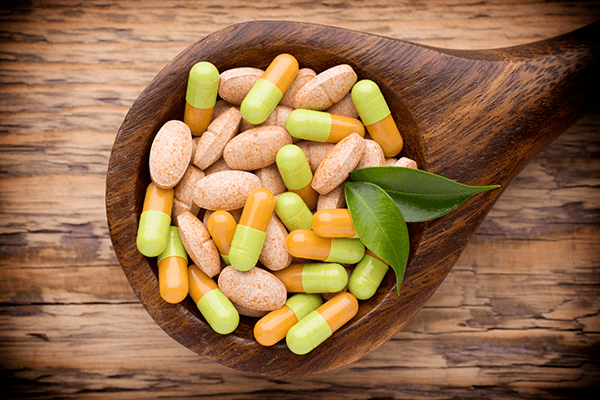
Dietary Supplements can Help
Eating a balanced meal is vital in maintaining a healthy body; however, people often neglect certain food groups which could result in vitamin deficiencies.
Vitamin and mineral supplements are a good way of making sure you get a good balance of vitamins and minerals in your diet. Multivitamins are the most common type, but there are also supplements to help with specific conditions such as high blood pressure or cholesterol, digestive problems, eye health, skincare, and energy-boosting supplements that can complement your existing diet plan.
In addition to proper nutrition, dietary supplements can help make up for the lack of vitamins that would otherwise be lacking.
Losing Appetite and Nausea is common
People undergoing treatment for cancer often find themselves vomiting at some point; nausea due to chemotherapy drugs alone is responsible for up to 50 percent of people’s inability to tolerate their treatments.
Eating side effects for those undergoing treatment are common. Fortunately, many of these effects pass when treatment is over.
For those suffering from nausea and other illnesses due to treatment, it is important to realize the value of food in their treatment. When undergoing treatment, you should expect that the quantities of food being eaten will change. This is completely normal.
However, while appetites might decrease, it is vital to eat regularly as the body needs the nutrients in order to continue fighting cancer. Eating even small amounts at every meal will enable you to feel better and take charge of your life during this time when you are focusing on healing yourself.
While there isn’t a single magic food that can help cure cancer, there are some foods better at combating it and the benefits of good nutrition to the body’s ability to fight cancer cannot be discounted.
MenuSano can be used to Help
For foodservice businesses that are involved in preparing and providing meals to those in recovery, MenuSano’s nutrition calculator is an essential tool.
The Recipe Builder allows you to pick any food item from our limitless database of foods, along with serving size options based on standard measurements (teaspoons/tablespoons/cups/etc), weight measurements (grams/ounces), or volume measurements (millilitres/litres).
This tool can be used to easily build unique and healthy recipes with specific ingredients and in specific amounts that will help maintain a nutritious and healthy diet.
MenuSano has partnered with after BREAST CANCER Charity to help improve the lives of women dealing with this illness. As the founder of MenuSano, Sonia Couto is herself a breast cancer survivor and knows that while food alone cannot cure cancer, studies have shown that dietary changes have been found to increase the quality of life in those living with the disease.
If you’d like to learn more or donate to after BREAST CANCER, click this link to be taken to their website.
You can also click here for a free trial of MenuSano. If you are selling food products to someone who’s recovering from treatment, or just want to see the nutritional content of your own recipes and dishes, MenuSano is the easiest and simplest way to get that information.
And for the month of October, for every new sign up on a monthly MenuSano plan, we’ll donate $5.00, and for every yearly sign up we’ll donate $10.00 to after BREAST CANCER.
